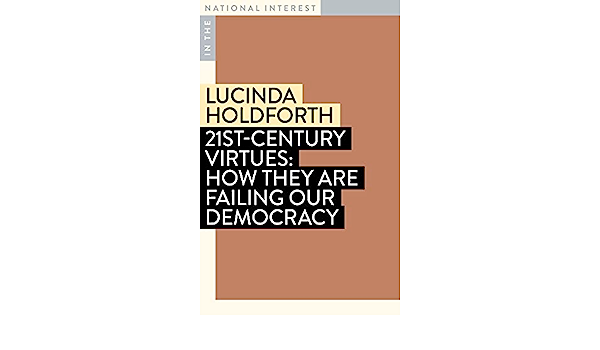With Modern Leadership Virtues, She Finds Fault
August 02, 2023
Are 21st century leaders flaunting the wrong virtues? And are their communicators helping them do so? In her new book, Australian speechwriter Lucinda Holdforth says yes.
I read to my sister one of the opening graphs of my friend Lucinda Holdforth’s new book.

“Yes, I suppose that Empathy, Humility and Vulnerability are nice. They are seemingly inoffensive,” Holdforth begins. “The unkind might say they are insipid, as in fact I do. Is this the very best the 21st-century elite … can offer by way of moral guidance to themselves and others? These modern virtues have something in common: They are self-referential. There’s a relentless circling back to the individual’s subjective state of being. Imagine an exercise in moral self-interrogation: Am I authentically me? Am I looking after moi sufficiently well? Even though I’m so great, am I also not relatably humble?”
My sister laughed excitedly and said, “Women don’t usually write like that!”
Men either these days, it seems to me. Which is precisely what makes this wee volume as delicious as a sophisticated but tiny gourmet dessert. And why one must taste it carefully. As I’ll try to do, for you.
Holdforth is the delightfully named Australian speechwriter who I’ve known for many years. She wrote speeches in Australia’s Labour government, and she wrote them for CEOs of major corporations, including Qantas Airways. She’s also one of the best people I’ve met in the business—and owner of one of the best writing minds I’ve known in any business.

I partnered with her to convene the inaugural Asia Pacific Speechwriters Conference a few years ago in Sydney. In a speech I’ve delivered in many countries on several continents, I quote from Lucinda’s last book, Leading Lines.
Alas, I discovered in her new book that Lucinda has come to disagree with the thrust of my speech: that modern corporate and political leaders can and must communicate their humanity to constituencies hungry for inspiration and connection with the leaders of modern institutions.
Harumph, says Holdforth.
Today, of course, a term of admiration for many leaders is that they are “relatable.” I presume this means they remind us of our ordinary, authentic, approval-seeking selves. But do we really want to live in a democratic world so small-minded that our primary need of our leaders is that they be just like us? I for one do not.
Now hold your horses, Holdforth. I tell my speechwriting pupils that audiences want to know not one but two things about a leader when they listen to a speech, or encounter the leader in any other situation:
First, what makes that person so special? Why are they up there and I’m down here? And audiences want a very clear answer to that question. But then, they also want to know what also makes the person common enough, sufficiently down-to-earth, to understand the human beings in the community they’re leading. In that order, but both important—and not so new, either. It didn’t start in the 21st century that people asked those who met a celebrity or a CEO, “Was he/she nice?”
So while I agree with Holdforth that “relatability” may be overemphasized in this moment, I think this is one leadership virtue that generally transcends trends.
Holdforth holds “vulnerability” in even less esteem.
We are all going to suffer, and we will all die, and yes, we will all fail at something that matters to us. So it’s true, we are indeed vulnerable. That is the human condition. We are just Shakespeare’s “poor, bare, fork’d animals.” Vulnerable to loss and pain; to insults, threats and slights; to indifference, exclusion and underestimation. Prone to our own delusions, dreams and fears, our tramatic memories and improbable fantasies. Susceptible to disease and death, accident and misadventure. And, absolutely, some of us are more vulnerable than others to active or passive discrimination on the grounds of our race, appearance, age, gender, sexual orientation, body shape, injuries, disabilities and sometimes even our abilities. …
But!
Is dwelling on vulnerability, especially by people with comfortable middle-class lives, positive? Or is it dangerously self-indulgent and, ultimately and ironically, self-fulfilling? Perhaps this explains the current fashion for cultivating greater “resilience.” It seems we haev designed a virtue so culturally corrosive that it acts like a disease and requires a cure.
And here I dare split hairs with my friend once again. I don’t think people promote vulnerability as a virtue, but rather leaders’ willingness to acknowledge their vulnerability at appropriate moments and in humanizing doses—thus, giving tacit permission to others not to have to go around pretending to be impervious, then going home and kicking the dog or drinking vodka in the middle of the day. (As so many working fathers and housewive mothers took turns doing in the 1950s, in our collective memory.)
In leading my own company, I know my main job is to maintain general cheerful calm. But if I deny myself the occasional emotional admission or moment of weakness—then I effectively forbid those expressions in my colleagues. And I don’t want to do that.
But back to Holdforth, who you can see is forcing me to think—and you too, I hope.
Can Holdforth really question the value of authenticity? To paraphrase a politician who ran on the strength of his deeply affecting personal narrative: Yes, she can.
Holdforth reminds us how great leaders have been and must be more than salt-of-the-earth, what-you-see-is-what-you-get types. Rather, leaders of large institutions must be nuanced and multi-faceted operators capable of sacrificing their personal feelings and convictions for the greater good. Also? Holdforth points out that many of our leaders are not great at all.
I worked in and with large Australian corporates for many years, and I saw even second-tier executives end up with more money than they knew what to do with. These executives rode on the history of a strong brand, sometimes a former government-created and owned brand, and watched their business thrive on a legacy of product recognition and community goodwill, plus a share-price boom on the stock market. Some executives I worked with were more talented than others, but most of them you wouldn’t vote for on the strata committee of your apartment block, let alone elect to the local council.
So what’s the return on investment on projects meant to express and animate the “authenticity” of CEOs and other mediocre clothes horses in charge of our largest institutions? Or put simply, is it good to be authentic, if you’re an asshole? We’ll have to answer that one on a case-by-case basis, I guess.
But Holdforth’s largest point cannot be dodged, I’m afraid—not altogether, anyway. We live in a world of preposterous income disparity and outsize corporate influence. Holdforth calls it “neoliberalism,” but you don’t have to, to agree that in our society, “wealth and power are controlled by an unelected elite, resulting in the decline and decay of the public commons, the public spaces, the public utilities, the public good.”
To which I would only—and a bit quietly—add that the opposite is also true: The decline of the public apparatus has cause people to turn to CEOs and other “unelected elites,” in order to fill the vacuum in sane-sounding, productive-seeming societal leadership. Elon Musk excepted, we don’t have to deal with Donald Trump or Marjorie Taylor Greene on corporate earnings calls.
Still, I will be haunted by Holdforth’s question: “If the steamroller of neoliberalism is the problem, how on earth will a focus on personal authenticity and vulnerability provide the solution?”
And in the end, I cannot disagree with her conclusion, about the overemphasis on the personal traits of public leaders:
We don’t need leaders who fixate on individual experiences and extrapolate policy from them. Nor do we need a philanthropic or charitable world where the focus is purely on responding to the most touching individual cases, those that evoke our “empathetic” feelings. We need leaders who operate out of reason and who are, in the end, informed by boring old data and history and facts and statistics. A good heart matters, but a wise and well informed head is essential.
No, can’t argue with a word of that; I would only add that while authenticity and vulnerability and relatability might be too highly revered in leadership these days, they’re pretty essential and timeless tools in leadership communication. Even old Napoleon said a leader is a dealer in hope. My old man used to say that the heart has reasons that reason doesn’t understand. And old Holdforth herself said—and this is what I quote in my speeches—that people are galvanized by leaders who use any means necessary to provide an emotional “ax for the frozen seas between us,” as she puts it.
Holdforth writes in Leading Lines:
“Perhaps it is because there is some rough magic in the communal experience of listening, and a grace that comes with giving an individual the opportunity to speak their considered thoughts aloud in the welcoming presence of others. We come together to breathe in tandem, to experience our own responses and feelings alongside each other—and sometimes, if we are lucky, and if the speaker speaks truly, in deep connection with each other.”
That doesn’t contradict any of what Holdforth writes in her bracing new book. Sufficiently sophisticated communicators—and leaders worthy of their counsel—can hold all of Holdforth’s ideas in their minds at once.
In fact, they must.
Step one: Get your hands on Holdforth’s little book and have your own conversation with it. It’s available now, on Kindle (and Nov. 1 in the U.S. in paperback).
***
I sent the above to Holdforth and gave her a chance to respond. —DM
Free speech is like a muscle: It sustains its strength and power only if we exercise it on a regular basis. Great to hear your honest thoughts about 21st Century Virtues and thank you for the opportunity to respond in your space.
I wrote this essay because, as a speechwriter, I am alert to words in our culture and what happens to them. Some words, for example, have gone into hibernation: we don’t hear much praise of reliability and constancy anymore, do we?
But there are a bunch of words we hear almost incessantly: Authenticity, Vulnerability, Empathy are three of them. We also hear a lot about Self-Care and “My” Truth. Humility is ubiquitous, in fact it is practically mandatory in public communications.
In the absence of other tempering virtues, collectively these qualities come together as a relentlessly self-centered world view. They are focused on individual uniqueness, personal experiences of reality and the quest for self-acceptance and self-love.
Ultimately, they elevate feelings over facts, and privilege the self before society. This matters because democracy fundamentally depends, as the Nobel Prize winning journalist Maria Ressa reminds us, upon a “shared reality” based on “facts, truth and trust.”
So what’s wrong with an emphasis on “authenticity” in leadership communications, you ask? What’s wrong with a display of vulnerability? Nothing intrinsically wrong, of course. Every rhetorician from Aristotle onwards has emphasised the power of “pathos” to persuade.
But I believe it’s more important for an ethical leader to focus on integrity (an external, verifiable code of behaviour) than authenticity (a commitment to one’s subjective self-judgement, and worryingly akin to that most repellent of concepts, the “personal brand”).
As for vulnerability, well, elevating “vulnerability” from an inevitable human attribute to a leading democratic virtue seems to me a recipe for social decline. It also strikes me as a rather implausible communication strategy for your average millionaire CEO or politician in a world where the division between the super-rich and the rest grows ever wider.
Right now, I look to Ukraine, where a diverse and united people are fighting for sovereignty and survival against a monstrous Russia. I see how powerfully President Zelensky has won global hearts and minds, not by focusing his own or Ukraine’s weaknesses, but on the courage of the Ukrainian people and their cultural and democratic strengths.



Perhaps the real problem is that leaders would never engage in a serious discussion of virtues like the two of you are on this page (to my delight, because I believe all speechwriters are philosophers.) Sometimes we bring out the authenticity of the people we support, but let’s be honest, sometimes we just disguise narcissism. I like to think that our words might seep into leaders as they practice our words, but I’m sure Seneca thought the same about Nero. There are no philosopher kings and when I learned what writers of The Bear made per season, I gained some renewed gratitude for our profession. But Holdforth’s criticisms are valid, not because they rebut well argued points about supporting leaders well, but because our strategies might be serving the elite too well.
So astute, Dan. Thanks.
Great points made all around. Like being in the Agora hearing interesting points of view debated – love it.
For me, Lucinda’s response contained the key ingredient that leaders are happy to avoid: integrity.
Perhaps because few have it.
She said, “…I believe it’s more important for an ethical leader to focus on integrity (an external, verifiable code of behaviour) than authenticity (a commitment to one’s subjective self-judgement, and worryingly akin to that most repellent of concepts, the “personal brand”).”
When your salary is an embarrassment, when you failed upward to your position or lied to get to where you are, when you have no original ideas to entice the imaginations of your audience, you talk about authenticity and evoke empathy to disguise you’re wearing no clothes, like maybe about how as a little boy or girl you got disappointed or an owie, but then overcame the odds to rise up and get over it – huzzah! *wait for applause*
I coach clients leading transformational change and the number one issue, by far, why change fails is because leaders are not wanting to hold others accountable because they themselves do not want to be held accountable. Companies making $1B per quarter talk big but do little more than keep the machinery running so the money tree doesn’t die on their watch.
Most leaders are “Quo Mongers” who talk change but act without agency to support change because the status quo is really working out well for them, for now.
Ethos, Pathos, Logos may dress in new, more trendy clothes with new names like the ones dissected by Lucinda, but she is right, without Ethos, a lot of Little Emperors are dressed without pants. And for some, it must be very cold.
Damn, Yates. That’s a nice addition to all this. Thanks.